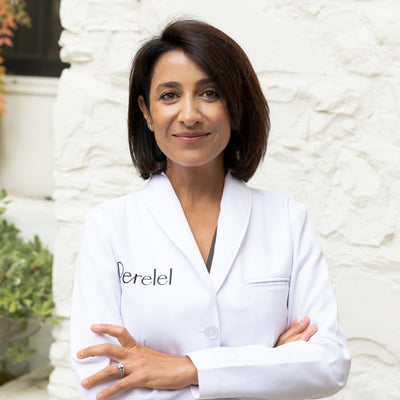DHA. Three little letters buzzing around in your brain as you’re researching prenatal vitamins, right? We rang up our Perelel Medical Co-Founder, Dr. Banafsheh Bayati, MD, OB/GYN, FACOG to fill us in on exactly what DHA is, and why you and baby need it.
What is DHA?
“DHA is an omega-3 fatty acid. The three most abundant types of omega-3 fatty acids include: DHA, EPA, and ALA,” Dr. Bayati explains. “Omega-3 fatty acids are essential throughout our lifespan. Rather than being stored and used for energy, they play important roles in bodily processes including reducing inflammation, improving heart health and brain function.”
“Unfortunately the American diet is poor in omega-3 fatty acids in comparison to omega-6 fatty acids. In fact, we have the lowest intake of omega-3’s through diet in comparison to other developed countries,” Dr. Bayati says.
How Can You Add DHA to Your Diet?
“DHA and EPA are found mostly in certain fish including anchovies, salmon, sardines, tuna, eel, and shrimp,” Dr. Bayati suggests. But wait, don’t those fish come with mercury concerns? Yes, they do. “The concern of higher mercury or PCB’s or other toxins in fish sources should be considered. Staying away from larger fish such as wild swordfish, shark, and mackerel helps, along with supplementation from a clean source,” Dr. Bayati explains.
What are the Benefits of DHA During Pregnancy?
“During pregnancy and breastfeeding our need increases and the benefits of DHA are even more notable,” Dr. Bayati says. “Omega-3 fatty acids are critical for fetal brain, eye and nervous system development as well as providing anti-inflammatory and tissue protective benefits. Omega-3’s continue to support brain development and immune function for the infant postpartum. Studies also show that omega-3’s support a healthy birth weight, gestational length, as well as improve attention and focus in infants and children, and decreased incidence of allergies in infants. They also support the mother’s heart, brain and cognitive function, joint mobility, eye health, skin and hair as well and immune response and mood postpartum.”
How to Properly Supplement DHA
If you’re worried you might not be getting enough DHA in your diet, it’s wise to consider supplementing with a prenatal vitamin, like our core prenatal. When you take your supplements matters too. Dr. Bayati explains, “the best way to ensure absorption of these supplements is to take them with a meal that contains good healthy fats.”
Why You Need EPA with DHA
“Newer studies are highlighting the particular benefits of EPA in regards to reducing inflammation as well as noting the role EPA plays in transporting essential fatty acids including DHA across the placenta and cell membranes. Thus supplementation with DHA alone as provided with most prenatal vitamins is not sufficient,” Dr. Bayati says. Think of EPA as the messenger that gets DHA across the finish line to do its righteous job. This winning combination of DHA and EPA is one of Perelel’s biggest differentiators in our science-backed prenatal formulations.
Keep in mind, when it comes to DHA, more is not always better. “It is noteworthy to mention that over supplementation with DHA and EPA carries risks as well, especially in regards to bleeding. Thus more is not better. Perelel strives to provide clean sources of omega-3 fatty acids with ratios of DHA and EPA that are backed by science as a supplement to a healthy diet,” Dr. Bayati says.
Support your motherhood journey with vitamins formulated for the unique needs of each phase, from preconception to postpartum. Do you have more questions about the science of prenatals? Connect with us on social and fire away!
This article is for informational purposes only. It is not, nor is it intended to be, a substitute for professional medical advice, diagnosis, or treatment and we recommend that you always consult with your healthcare provider. To the extent that this article features the advice of physicians or medical practitioners, the views expressed are the views of the cited expert and do not necessarily represent the views of Perelel.
Written by Jessica Lopez. Jessica Lopez is a freelance writer, digital content creator, and new mother. She has covered all lifestyle topics ranging from bridal to beauty for publications including Brides Magazine, Byrdie, THE/THIRTY, and more. Walking wide-eyed into motherhood has inspired her to connect with other parents through her writing and shared experience. You can follow more of her journey @Jessica.H.Lopez.




















